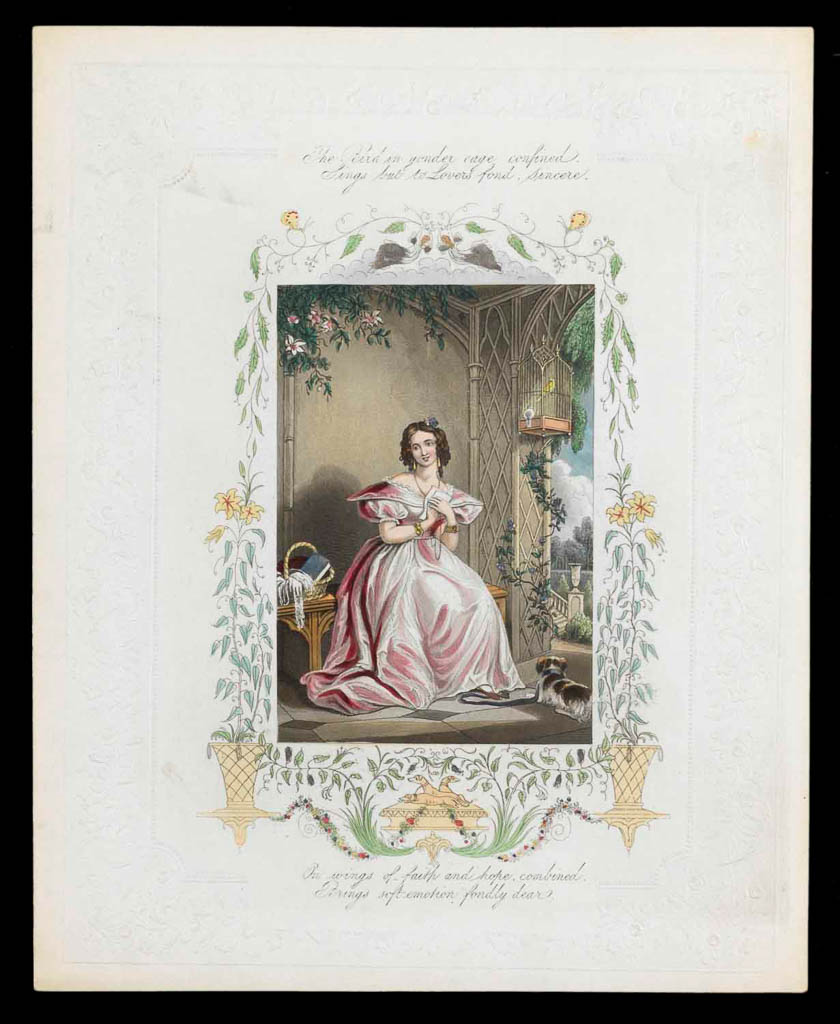Current Location: In storage
Titles
Valentine card
Maker(s)
Publisher:
Unknown
Entities
Categories
Description
Aquatint and etching with hand-colouring on 4to-sized embossed white wove paper. From 'The Despondent Lover' (or 'The Unrequited Love') series. The border is lightly embossed with a design of leaves and flowers with lines of verse etched at upper and lower centre: "The Bird in yonder cage confined / sings but to lovers fond, sincere / On wings of faith and hope, combined / Brings soft emotion, fondly dear." An inner etched border of entwined leaves, flowers, urns and butterflies surrounds the central panel which shows a young woman seated inside a loggia interior clutching a love letter to her breast, a canary in a cage above her to the right and a spaniel at her feet. The etched border has been inexpertly hand-coloured. The inside pages are blank.
Legal notes
Bequeathed by Dr J. W. L. Glaisher, 1928
Acquisition and important dates
Method of acquisition: Bequeathed
(1928)
by
Glaisher, J. W. L., Dr
Dating
19th Century
Production date:
after
AD 1828
Note
Frank Staff says of the series: 'The central picture of each shows a delightful aquatint, beautifully coloured and finished by hand. Although some of the scenes depict young ladies in grief, and one shows a jilted lover, not all of them are unhappy. In fact, one shows a young lady radiantly pleased with herself clutching a love letter to her bosom [this describes P.14346-R-1]. ... The set numbers fourteen in all, which was recognised as the regular "valentine dozen".' There are in fact thought to be upwards of seventeen numbers in the series and not the fourteen as stated by Staff. The series is thought to originate with Joseph Addenbrooke, as Frank Staff refers to a set of this series (whereabouts unknown) which is printed on paper watermarked with a date of 1828 and which also has Addenbrooke's name imprinted. Staff believes it likely that some time later the plates came into someone else's possession, who then filed off Addenbrooke's name from them and reprinted the entire series on un-watermarked paper. This, says Staff, 'could explain the plentiful supply still available and the comparatively worn state of the embossing on some copies.' See, Frank Staff, _The Valentine & Its Origins_, Lutterworth Press, London, 1969, figure 64, p. 60 and pp. 62-3. The examples in the Glaisher collection are on un-watermarked paper and without a maker's stamp and are most likely later reprints. The Museum of London also holds examples of these prints, which they believe to be later reprints made from some of the plates by Jonathan King himself (some bear his embossed address stamp) and they date them c.1870-1885. If King did possess some of the plates, it is possible that Glaisher may have bought some of his reprints from King, in the same way that he most likely bought reprints of the James Kendrew valentines in his collection from King.
The early date of 1828 given by Frank Staff to the 'original' series thought to have been published by Joseph Addenbrooke, may not be entirely infallible given the possibility of the laying down of watermarked paper for use at a later date and given also that at least two of the central images which appear in the series are reproductions after paintings by the artist, Edmund Thomas Parris (1793-1873) which are known from etchings made after them by Charles Heath (1785-1848) in the early to mid 1830s for his publications, _The Keepsake_ (1834) and _The Book of Beauty_ (1835) (The illustration 'Antonia' - a woman leaning from a casement window, an envelope in her hand - in this latter publication which appears as one of the numbers in 'The Despondent Lover' series is not among those collected by J.W.L. Glaisher. See Museum of London, Jonathan King collection of valentines: 34.170/794). The image of the woman in the loggia seen in this number from the series was etched by Heath c.1834 as an illustration to a poem entitled _The Proposal_ by Ralph Bernal M.P. which was published in Heath's literary journal, _The Keepsake_ in this year. However, it is also entirely possible that the Parris paintings date from 1828 or before and that Addenbrooke produced etchings and aquatints after them for his series and that they were then later additionally etched by Heath, who may even have been inspired by the Addenbrooke series in the selection of images for his publications.
School or Style
British




